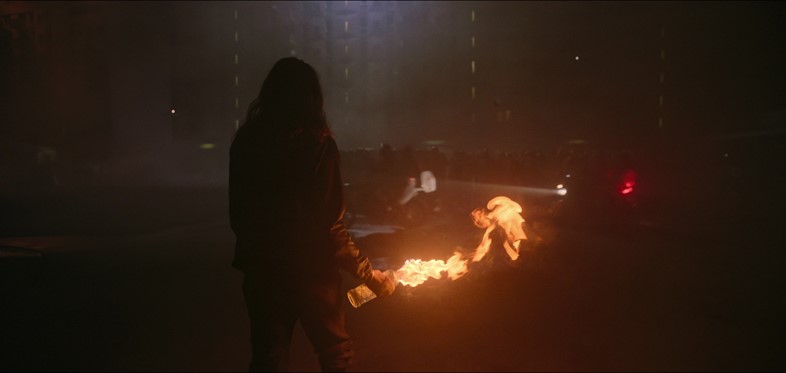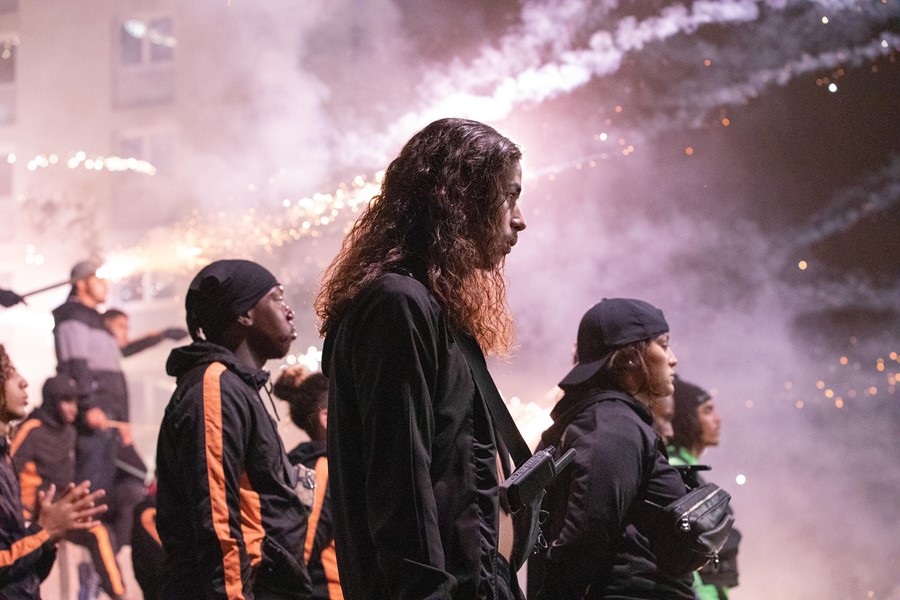The French filmmaker and pop provocateur talks about Athena, his explosive new drama which recasts powder-keg tensions in the Paris banlieues as Greek tragedy
Across Romain Gavras’ oeuvre, violence ignites like the crack of flint and swells across the screen like a bloom of smoke. Having cut his teeth directing for the likes of MIA and Jay Z, Gavras’ early music videos are shot through with a cinematic, violent lyricism that mediates on the potent power of image-making, from the provocative viscera of Born Free to the delirious anarchy of No Church in the Wild. “They’re almost like poems, music videos,” Gavras says. “Whereas a film is like a novel.”
Athena, Gavras’ third narrative feature, is a direct heir to his initial music video days, the intricate epic to his previous verses. Telling the story of three brothers – military man Abdel, insurgent Karim and petty crime boss Moktar – after their youngest brother, Idir, is killed following an altercation with the police, Athena is a film of staggering propulsion, tracking the civil war between police and civilians that breaks out in the family’s banlieue of Athena. Here, we speak with Gavras about the grandeur of tragedy, the French impulse toward revolutionary art, and the unequivocal politics of aesthetic filmmaking.
Anahit Behrooz: Athena sounds like a typical banlieue drama but it’s actually an incredibly epic and mythic film. What was it about mythology that felt right for telling this story?
Romain Gavras: I wrote Athena with my friend Ladj Ly, who directed Les Misérables, and from the beginning our idea was to create not social realism but a Greek tragedy. Greek tragedy has unity of time and unity of location, but it also conveys ideas through the power of constructing an image. It is always about grand things – blood, fire, nation. The idea was to have the intimate pain of these three brothers and [to see] this rage spill over into a nation that burns off-screen. They become mythological archetypes in the sense that, with a fire, there are only three ways to deal with it. Either you are a merchant trying to protect your interests, or you want the fire to stop, or you want to burn everything down.
AB: At the same time, Athena feels very French, not so much because of the banlieue setting but because of France’s tradition – from Victor Hugo to Delacroix – of making art about revolution.
RG: My director of photography Matias Boucard and I, our references were everything from films to Delacroix paintings – like [in the first scene], when the kids are holding a French flag on top of a van. We wanted an energy that is almost uplifting because every revolution starts like that: with a moment of grace and enthusiasm. But then the blood starts to flow and the tears start to run and the walls start to burn. In France, we’re taught only the good aspects of the French revolution, but it became an insane bloodbath. You have to have that romantic feel and then get darker. It’s like a movement towards chaos.
AB: So much of Athena is about this moral ambiguity. I’m curious how it was to craft that within structures that are often unambiguously bad, such as the police industrial complex?
RG: To say the police are bad and the youth are good, to have these very schematic visions, is I think only the varnish of the situation. At the end of the day, especially in France, there is a lot of police brutality – it’s why a situation like in Athena is possible. But it’s possible to take advantage of a situation that is tense. There are always forces pushing towards that conflict: police versus young people is what you see on the ground, but it’s usually the result of darker forces.
AB: By darker forces, do you mean structural systems?
RG: I think structures but also interests. Every war since the Trojan war has been based on a lie, from Archduke Franz Ferdinand to Colin Powell showing the fake vial [to the UN security council] that pulled us into war in Iraq. It’s people with an agenda that are pushing people on the ground to fight, and I think [Athena] also touches on that. How does a situation like this ignite? When a country is very fragile, like France, it’s very easy for people to use that chaos to push it into the ground.

AB: Early on in the film, you introduce the idea that it could have been a far-right fringe group rather than the police that killed Idir. Was this idea of external control what prompted this narrative shift?
RG: Yeah, I mean, throughout the film you see police violence and it’s in all our minds that it exists, but it’s easy for people who want more chaos to thrive in a situation like this. That’s not to say the police are good – it’s more that, in an already tense situation where there has been police misconduct and brutality, people can [build] on that. It’s happening all over Europe and especially in France, we almost had an extreme right-wing president in the last election. You can really feel that there is a push towards this – it belongs to their methods as well.
AB: You have a really distinctive visual style across your work. There can be a tendency when talking about highly stylised filmmaking to think of aesthetic as antithetical to meaning – critics often say Sofia Coppola is all style and no substance. What can such filmmaking achieve that more realist approaches can’t?
RG: The thing is, there are a lot of realist films that I love but in France, there’s this idea that if a film has a strong iconography, it’s vulgar. But my favourite films, from Akira Kurosawa’s Ran to Apocalypse Now, have a strong visual identity. Like you say about Sofia Coppola, her films are amazing because it’s style merging with substance and this is what cinema does: we are talking in images. Otherwise, we can write books. That’s not to dismiss people who do cinema verité, but especially when the intention is a tragedy – horses and choir music and everything – it’s weird to be like, ‘This is over the top.’
AB: You spoke earlier of movements towards chaos and I’m wondering if there is anything optimistic as well as pessimistic in that? So much of this film is about the aesthetics of anger, and anger can be productive.
RG: I don’t know. The ancient Greeks said of tragedy that it was cathartic to see darker visions of the near future unfold. I don’t know if that works. I think to see a vision filled with rage and to see where violence can lead… It can make you think, but I have no idea if there’s a positive message at the end.
AB: It’s so interesting that you’re resistant to catharsis even though it’s one of the main tenets of tragedy.
RG: Exactly. But we don’t know that it works: we have tragedy and the world has still become worse. Unfortunately, I don’t think art can change the world, you know.
AB: At all?
RG: Well, yeah. I think our duty as artists is to feed people’s eyes and heart and soul with new ways of telling a story, but our duty is to art. It’s like when people say video games and rap are making kids violent. I don’t think they are: it’s lack of money, education. But it works the same the other way. I’m always on the fence when I see filmmakers being self-righteous and saying: ‘Yeah, this is going to change the world.’ It’s blood and fire and tears that actually change the world.
Athena is out on Netflix now.
